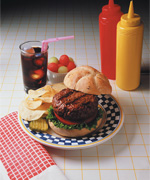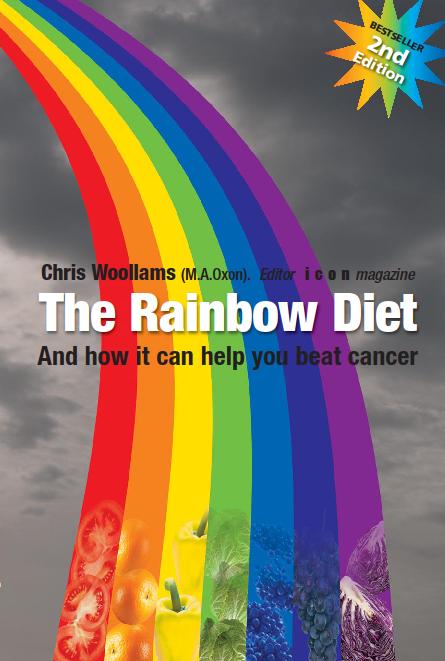
The top 10 foods for chemotherapy
The anti-cancer diet for people on chemotherapy
There are foods to eat on chemotherapy. And there are foods to avoid on chemotherapy. Here we tell you.
1. Eat oily fish and fish oils - Top of the list for a very good reason. There are several quality studies that show taking daily fish oils (and eating oily fish) can greatly reduce the risk of cachexia. Cachexia is the fear of hospital oncologists and nutritionists. Patients don’t want to eat when taking chemo drugs, and this can cause a downward spiral in weight which can lead to death. Fish oils are also very anti-inflammatory
2. Avoid common sugar - Glucose and high fructose corn syrup - and ice cream, bought fruit juice and smoothies, cake, buns, chocolate, biscuits, puddings, fizzy soft drinks, Ribena, alcohol, packaged and processed foods.
Go to: 20 links between sugar and cancer
3. Chew strips of ginger - Chewing Ginger can prevent the feeling of nausea. Ginger is also very anti-inflammatory and controls blood sugar. Another anti-nausea compound is green tea.
4. Avoid bad fats - Too much saturated fat, cows’ dairy, fatty meats, coconut oil, cheeseburgers etc. will increase LDL and triglyceride levels in the blood stream. Avoid fried foods and especially processed meats. This has been linked in several research studies to more metastases and lowered survival.
5. Eat more good fats - Extra virgin olive oil, EVOO, is very anti-inflammatory in the gut and will help calm you. It boosts gut bacteria. Walnut oil is good too. Good fats include EVOO, nut and seed oils, avocado and avocado oil, fish and fish oils. You could cook in avocado oil as it has a very high flash point. Good oil consumption will keep your weight up and keep you as healthy as possible.
6. Eat more soluble fibre - it boosts the immune system and helps fight constipation. One reason is that it is loved by your gut bacteria, which are under serious attack with chemotherapy and immunotherapy drugs. Soluble fibre is found in whole oats, nuts and seeds, and pulses like lentils, red kidney beans, broad beans, peas and chickpeas. Whole carbohydrates like organic brown rice and a jacket potato will help. But avoid bread, pasta and gluten - see point 8.
7. Eat eggs, and lean meat - The National Cancer Institute recommends eggs, fish, chicken and tofu to keep muscle strength during chemotherapy. Eggs also provide the raw materials for B vitamin production which is a casualty of chemotherapy. The can prevent hair loss.
8. Eat garlic, onions and take oregano oil - These compounds help control yeasts in the body. Yeast infestation is an often ignored but very real side-effect of chemotherapy. With a loss of good gut bacteria to keep them in check, they can infest the gut, cause leaky gut, get into the blood stream, debilitate you, cause fatigue, cause bloating and reduce oxygen in tissues. Gluten helps them enter the blood stream. Garlic and oregano oil can stop their build up; cinnamon in water is good too. Garlic has been shown to limit blood supplies to tumours and Cornell showed onions can limit cancer spread.
9. Eat lots of deeply colourful vegetables - but only a little fruit - Fruit can provide too much sugar and your yeasts will ferment it if you eat it after meals. Eat early morning after half a lemon squeezed in water. Then it’s a rainbow of vegetables, Greens and orange - carotenoids; Deep purple cherries, aubergines, beetroot - anthocyanins; curcumin, green tea, broccoli - polyphenols - it’s all in the Rainbow Diet book.
Go to: The Rainbow Diet
10. Eat little and often - small nutritious meals, 5-6 times a day, with perhaps two half pints of green juice. Eating little and often combats poor diet; when you do eat, make it nourishing. You only have one body.
* * * * * *
We produced this list because several of our intrepid fans have been alarmed by the coffee mornings cake and biscuit of mainstream UK cancer charities and an NHS booklet that tells all people having chemotherapy to eat a junk diet high in sugar and bad fats.
This mass market calorie-ladened approach is a very old fashioned view and out of kilter with American Hospitals which talk of ’tailoring’ nutritious diets to individual needs. We asked a team of health experts around the world what they thought (click here to go straight to the article).
But the most important article is a diet for chemotherapy which gives the answers, the diet options and explains simply the politics and why patients are being misled. It is a MUST READ ARTICLE.
Go To: A Diet for Chemotherapy
In this Chris Woollams takes all the expert suggestions and adds in some of the very latest research findings we have covered in Cancer Watch over the last few years. For example, there is expert research that Calorie Restriction and even Fasting improve the success of chemotherapy and increase survival times. And that people with the highest levels of blood glucose survive the least!!!! Don’t you think everyone should know this??
Go to: Fasting, calorie restriction and cancer
You may also want to look at a piece which was one of our icon magazine centrefolds - 20 things you need to know about chemotherapy (click here). This will give you tips and ideas, not just on cancer nutrition, but on other things you can do to make your chemotherapy more bearable.

 Go here to read more on THE RAINBOW DIET
Go here to read more on THE RAINBOW DIET
Meanwhile we recommend you steer clear of all sodium, sugar, caffeine, animal fats, fast food (including Cheeseburgers), snack foods, refined wheat (including cakes) and dairy (including milkshakes) but try and build your potassium and magnesium levels (nuts, pulses, green vegetables, red peppers, fish, apples, bananas, garlic etc etc).
In defence of the NHS Dietitians, we found that they had so little time and were so stretched that they only really ever saw the 7 per cent of patients suffering cachexia (severe weight loss DUE to chemotherapy drugs) - and patients can die from this, so obviously it is their prime focus.
That does not mean their booklet should be used by the other 93 per cent of people on chemotherapy though.
CLICK HERE TO GO TO ’A DIET FOR CHEMOTHERAPY, by CHRIS WOOLLAMS